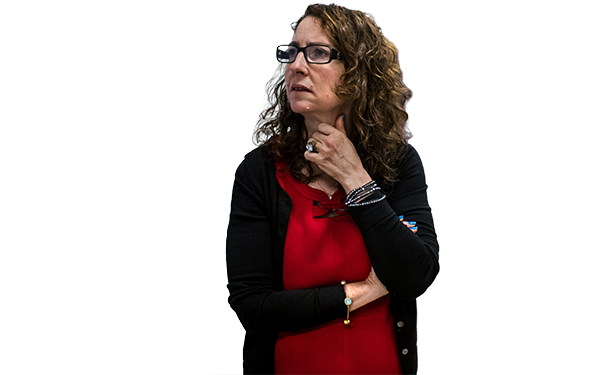Bradford: Maybe It’s Time for Eva Moskowitz’s Critics to Stop Hating and Start Creating

Success, as well as failure, often makes people pick sides and, if the latest New York Times expose is any indication, so do Success Academies — the New York City charter network that serves over 11,000 students in 34 schools and which is arguably the country’s most successful school district filled with low-income kids of color.
A Times feature published last week was built around a video leaked exclusively to the outlet that captured a teacher’s reprimand of a young student for incorrectly describing a math problem. No one approves of the teacher’s reaction and the altercation violated standing school policies, resulting in a suspension and apology from the teacher to parents at the school who have since welcomed her back — all facts that were underscored to the Times. Yet the network’s opponents seized on the moment to suggest that these things happen all the time, and to reiterate their moral, philosophical and political opposition to the school and its ways. In wading through comments on the article, and outrage to be found across social media, it quickly became clear: These folks don’t approve of the Success model, its focus on both order and joy, or its stellar results for kids of color — and they just want to see it gone.
Of course, Success families and staff (and board members like myself) have another view; one that focuses on constant growth and improvement and that is deeply grounded in a parent’s right to choose the school that works for their child. They also know when you get thousands of kids and adults together mistakes can and do happen and that recovering from those mistakes is vital for everyone involved.
And while success is a goal we have for all children, Success might not be the right fit for every child either. Differentiation and choice are crucial to chartering and, arguably, their absence is the biggest problem with traditional district schooling overall.
So for all the Success haters out there I have some advice. If you want Success, or other “no excuses” schools to go away because you think your own brand of education is superior, because you don’t respect that other parents like it and seek it out, you don’t value the structure, or you want your kid to be a grass-fed open-range child, then you just have to, counterintuitively, do one thing: open more charter schools.
“Chartering” as an engine to create schools and attack achievement gaps in this country is still in its infancy. In fact the very first charter school law was passed in Minnesota only 25 years ago. As other states passed charter laws they tended to focus their policy goals on innovation and autonomy, but also on persistent gaps in student achievement that are essentially a death sentence to children of color. New York’s law, for instance, emphasizes “increasing student achievement and decreasing student achievement gaps in reading/language arts and mathematics” among its criteria for charter approvals.
Those were the founding goals, and those are the kind of charter schools we built. Though I would argue Success Academy is in no way a “no excuses” school (I guess people like “some excuses” schools — where the staff apologizes because your kid didn’t learn anything — better) it is of a flavor that represents the movement’s first, best guess at what a school should look like to level the playing field for kids of color who are traditionally underserved, and to offer families choice who have had very little of it. Success has a particular emphasis on iteration in its DNA so, despite what detractors think, it is always in a constant state of evolution. This internal reinvention is just one of the reasons its assessment scores remain high even with the change to more rigorous standards in New York state.
But because Success, along with several other better known early actors, have generated strong results early on, there has been a tendency among authorizers (who bring the schools into existence and monitor their performance), charter founders (who look to what currently works for guidance), as well as parents/students (who see a good thing and go for it) to keep making more of what we already have because we know more about it. My smart friends call this institutional isomorphism, which is the tendency of a new thing to resemble the thing that came before it. The best example of this phenomena may be traditional district schools themselves, which struggle to do anything different that isn’t also highly selective (magnets and gifted and talented programs for instance) and where performance is more a factor of a parent’s household income than difference of practice in the schools themselves. Similarity and sameness are the enemies of choice and creation, but they are a trap of “safety” that change falls into easily and often.
So while the old school monopolists want to deal with charters like Success Academy and other school types they fear (or don’t respect) by eliminating them — though parents like these schools a great deal and continue to choose them in droves — they should be doing the opposite: opening more of them. Across the country, micro-schools are now popping up, catering to students’ individual needs. No parent has to choose Success — or its model — but to the extent there are fewer choices to be had, it is more likely Success will be chosen.
Indeed there are enough families on Success Academy wait lists that, even as the network grows to 100 schools, long wait lists might remain. But this might not happen since every parent also has the ability to close Success by not choosing it, which is the most overlooked and powerful part of the charter school model.
But Success aside, you also won’t get the “Charter School of Free Range Liberal Arts,” or the “Academy of Opting Out” unless someone takes a chance and opens them, and unless parents decide to choose them. The district seems content to try “charter-lite” for its wealthiest parents in the Brooklyn high rent district. Maybe they’re figuring out that, to beat “Success” they’ll have to join them in giving parents what they want and a choice about getting it?
But those folks who pounced on last week’s Times article seem unwilling to give working and low-income families the same service or options — which may tell us all we need to know about their opposition to the schools doing the best job of educating New York’s black and brown low-income kids. It is driven by a profound lack of respect for the parents and students who value the sort of education Success Academy offers. And it’s an overreaction that serves those with wealth and choice far better than it serves those without it.
Campbell Brown, co-founder and editor-in-chief of The 74, serves on Success Academy’s Board of Directors
Get stories like these delivered straight to your inbox. Sign up for The 74 Newsletter

;)
